|
|
|
Sort Order |
|
|
|
Items / Page
|
|
|
|
|
|
|
| Srl | Item |
| 1 |
ID:
138234
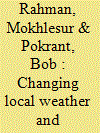

|
|
|
|
|
| Summary/Abstract |
Coastal Bangladesh is experiencing the effects of weather and climate-related stressors. The paper reports on the ways in which members of nine occupational groups in two coastal villages in South-west Bangladesh understand and respond differentially to recent changes in local weather and weather-related events and processes. Their understanding is grounded in local experiences and varied livelihood options, which are a complex interaction between people’s social and spatial locations and local weather and non-weather events and processes. Their priorities are to protect livelihoods through resilience-building actions, which address proximate causes of vulnerability (improving coastal embankments, rehabilitating and strengthening homesteads, protecting agricultural land). Government support is limited to traditional development interventions that assist some more than others and often disconnected from local people’s priorities. Most adaptation actions are practical measures within the prevailing politico-legal order. There is some evidence of more rights-based cooperative action between a national non-governmental organisation and local farmers that challenged aspects of that order.
|
|
|
|
|
|
|
|
|
|
|
|
|
|
|
|
| 2 |
ID:
138238
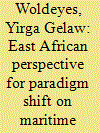

|
|
|
|
|
| Summary/Abstract |
This paper advances the view that the meaning of maritime security should be considered based on lessons of history and requirements of human well-being. It challenges the tendency to separately view maritime security from the political, economic and social structures of the East African littoral states. Based on a critical reading of the history of the development of violent colonial structures in the region, the paper shows that most security discourses in relation to East Africa advance a paradigm that legitimises the control and management of the region’s maritime domain under the surveillance of foreign powers. The framing of poverty and conflicts as internally caused and economically motivated power struggles within fragile states contributes to this paradigm. This paper argues that the East African maritime domain is an integral part of the hinterland, and maritime security should be understood from a perspective that addresses structural violence in the region.
|
|
|
|
|
|
|
|
|
|
|
|
|
|
|
|
| 3 |
ID:
138230


|
|
|
|
|
| Summary/Abstract |
This paper gives an account of the disappearance of Malaysian Airways Flight MH370 into the southern Indian Ocean in March 2014 and analyses the rare glimpses into remote ocean space this incident opened up. It follows the tenuous clues as to where the aeroplane might have come to rest after it disappeared from radar screens – seven satellite pings, hundreds of pieces of floating debris and six underwater sonic recordings – as ways of entering into and thinking about ocean space. The paper pays attention to and analyses this space on three registers – first, as a fluid, more-thanhuman materiality with particular properties and agencies; second, as a synthetic situation, a composite of informational bits and pieces scopically articulated and augmented; and third, as geopolitics, delineated by the protocols of international search and rescue. On all three registers – as matter, as data and as law – the ocean is shown to be ontologically fluid, a world defined by movement, flow and flux, posing intractable difficulties for human interactions with it.
|
|
|
|
|
|
|
|
|
|
|
|
|
|
|
|
| 4 |
ID:
138233
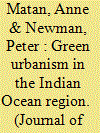

|
|
|
|
|
| Summary/Abstract |
The world is facing an ‘age of scarcity’ which will challenge all cities to reduce their resource footprint, especially carbon, improve biodiversity and at the same time continue to create economic opportunities and liveable places. This is green urbanism. These problems are being understood and cities are taking steps to resolve them. Around the world there are many emerging signs of green urbanism. This is a time for the Indian Ocean region, with its unprecedented urbanisation, to demonstrate to the world how to create a different kind of global economy that is more sustainable. Asia’s cities are predicted to be home to more than 60% of the world’s urban dwellers by 2050 and Africa will become even more dominant after that. The growth pressures in the region are clearly now dominating global urban demographics, but is the Indian Ocean region part of the solution or part of the problem? The first signs of the green economy are investigated through the theory of innovation waves and seven archetypal city types: renewable energy cities, bioregional carbon-neutral cities, distributed cities, biophilic cities, eco-efficient cities, place-based cities and sustainable transport cities. The first assessment of the contributions being made in the region shows considerable innovation happening in Asia. The opportunities for the region to lead the world in green urbanism are real.
|
|
|
|
|
|
|
|
|
|
|
|
|
|
|
|
| 5 |
ID:
138232
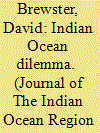

|
|
|
|
|
| Summary/Abstract |
This paper looks at the key strategic issues faced by China in the Indian Ocean within the context of growing Sino-Indian rivalry. It makes two basic arguments: first, that China has considerable strategic disadvantages in the Indian Ocean as compared with India; and second, that India has had more success than China in developing security relationships in the region. These propositions differ from a more common narrative, according to which China is establishing security relationships throughout the region that seriously threaten India. This paper argues that, on the contrary, China faces a strategic dilemma right across the Indian Ocean that it will only be able to partially mitigate in the short to medium term. Perhaps we should be asking how China’s strategic vulnerability should be best managed.
|
|
|
|
|
|
|
|
|
|
|
|
|
|
|
|
| 6 |
ID:
138229


|
|
|
|
|
| Summary/Abstract |
Much of the job which falls to the editors of relatively new academic journals such as the
Journal of the Indian Ocean Region (JIOR) is to forge epistemic and intellectual networks and alliances across an emerging academic field. And there can be no doubt that Indian Ocean studies and associated research ventures are relatively recent pursuits when compared to those works which have focused more heavily upon the Atlantic and Pacific oceanic geopolitical spheres. This is not to say that Indian Ocean interests have only recently emerged, but that rather, over recent decades, the intellectual and critical gaze of the academic nglosphere has been largely focused elsewhere.
|
|
|
|
|
|
|
|
|
|
|
|
|
|
|
|
| 7 |
ID:
138231
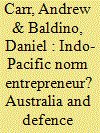

|
|
|
|
|
| Summary/Abstract |
The Indian Ocean is a region of increasing importance, with booming economic opportunities, shifting power dynamics and rising geopolitical competition. To manage this transition some Australian policy-makers are advocating the practice of defence diplomacy as a mechanism to help mould cooperative practices and to build regional trust while dissipating potential or ongoing regional flashpoints. Australia’s 2013 Defence White Paper identified Australia as an agent who can play a critical part in the emergence of certain types of norms as a means of conflict prevention and crisis management in the Indo-Pacific region. This paper explores the use of defence diplomacy as a means for seeking regional influence. It uses an innovative new framework of norm entrepreneurship to examine the choices facing Australian policymakers in increasingly complex security environment. This paper argues that while Australia should aim to promote defence diplomacy as a central part of rising security dialogue and practice with ‘like-mined’ countries, there must also be careful reflection to ensure that this objective is a constructive use of a middle power’s limited resources and influence.
|
|
|
|
|
|
|
|
|
|
|
|
|
|
|
|
| 8 |
ID:
138236


|
|
|
|
|
| Summary/Abstract |
The Indian Ocean has long been held to be an important arena for bringing lateral, south-south links into view and hence for theorising the Global South. Yet, how is this vast and abstract idea being given substance in the Indian Ocean world? This article approaches this question from a cultural direction, looking at various cultural formations that address themselves to the Global South. The article makes sense of this material by sorting it into three traditions, high, low and in-between. The first is dominated by themes of mourning and nostalgia for the lost utopias of the third world. By contrast, the low tradition works with idioms of popular culture: slapstick, comedy, consumer excess. If the ‘high’ tradition deals in epic, and the ‘low’ tradition in comedy, then the ‘in-between’ tradition takes account of both, relativising romantic accounts of south-south solidarity as it traces the faultlines within the south.
|
|
|
|
|
|
|
|
|
|
|
|
|
|
|
|
| 9 |
ID:
138237


|
|
|
|
|
| Summary/Abstract |
Climate variability and change present significant challenges for island communities in the Pacific and Indian Ocean regions. Understanding how climate science can be useful for island communities requires knowledge of decision-makers, their climate-sensitive decisions, and the context in which the decisions are being made. In this paper we report on an interdisciplinary research and outreach effort called the Pacific Islands Regional Climate Assessment. We describe potential impacts from the changing climate for island communities, including food and water security, disaster preparedness, human migration and national security. We highlight transferable lessons learned related to building resiliency, engaging innovative leadership and supporting integrated research and outreach.
|
|
|
|
|
|
|
|
|
|
|
|
|
|
|
|
|
|
|
|
|